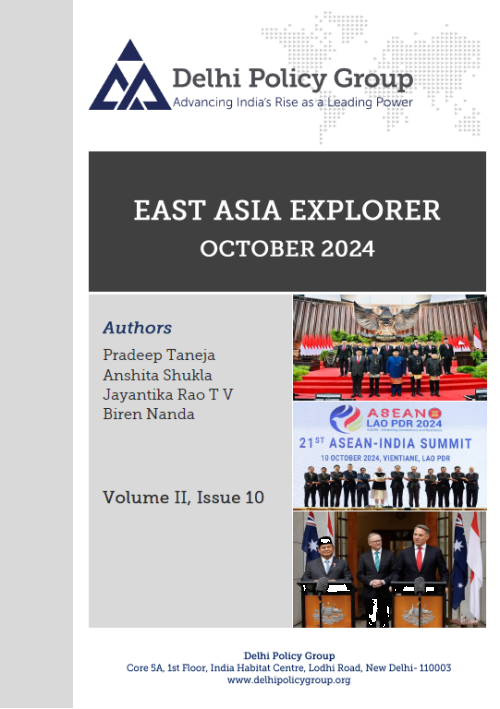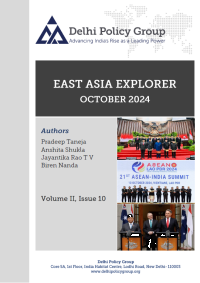East Asia Explorer
Date: November 06, 2024
The East Asia Explorer tracks evolving geopolitical trends, emerging security challenges, and progress towards regional integration in East Asia. It focuses on the ASEAN grouping, domestic and foreign policy developments in countries of East Asia and Oceania, great power contestation in the region, and India’s relations with ASEAN and its member countries.
In this issue, Dr. Pradeep Taneja analyses Indonesia-Australia ties as Indonesia transitions to the leadership of President Prabowo Subianto. He examines various aspects of this bilateral relationship, with a key focus on defence cooperation, which has been strengthened by the signing of the Australia-Indonesia Defence Cooperation Agreement (DCA) in August 2024. He also highlights the factors constraining the relationship, and how these might evolve under Indonesia’s new leader.
In her brief, Jayantika Rao examines the agenda set by Indonesian President Prabowo Subianto for his newly installed administration, drawing essential distinctions between Prabowo’s leadership style and that of his predecessor, Jokowi Widodo. She further explores how these emerging dynamics may influence Indonesia’s political landscape and its long-term policy alignments.
Anshita Shukla reviews the 21st ASEAN-India Summit and the 19th East Asia Summit (EAS) held on October 10-11, 2024 in Vientiane, Laos. She highlights elements of Prime Minister Narendra Modi’s participation in these two summits, and their main outcomes as reflected in official statements. She notes the absence of US President Biden from the EAS summit, and the implications for ASEAN centrality.
Finally, Amb. Biren Nanda analyses the challenges facing ASEAN in managing regional stability, amid continuing tensions between the United States and China. He identifies the major trends which can define the future of Asia in the course of this century, and their potential impact on the geopolitical landscape of Southeast Asia. His paper also underlines the strategic role of India’s “Act East Policy” in countering China’s growing regional influence.
To read this East Asia Explorer, Vol. II, Issue 10, please see the PDF attached.
In this issue, Dr. Pradeep Taneja analyses Indonesia-Australia ties as Indonesia transitions to the leadership of President Prabowo Subianto. He examines various aspects of this bilateral relationship, with a key focus on defence cooperation, which has been strengthened by the signing of the Australia-Indonesia Defence Cooperation Agreement (DCA) in August 2024. He also highlights the factors constraining the relationship, and how these might evolve under Indonesia’s new leader.
In her brief, Jayantika Rao examines the agenda set by Indonesian President Prabowo Subianto for his newly installed administration, drawing essential distinctions between Prabowo’s leadership style and that of his predecessor, Jokowi Widodo. She further explores how these emerging dynamics may influence Indonesia’s political landscape and its long-term policy alignments.
Anshita Shukla reviews the 21st ASEAN-India Summit and the 19th East Asia Summit (EAS) held on October 10-11, 2024 in Vientiane, Laos. She highlights elements of Prime Minister Narendra Modi’s participation in these two summits, and their main outcomes as reflected in official statements. She notes the absence of US President Biden from the EAS summit, and the implications for ASEAN centrality.
Finally, Amb. Biren Nanda analyses the challenges facing ASEAN in managing regional stability, amid continuing tensions between the United States and China. He identifies the major trends which can define the future of Asia in the course of this century, and their potential impact on the geopolitical landscape of Southeast Asia. His paper also underlines the strategic role of India’s “Act East Policy” in countering China’s growing regional influence.
To read this East Asia Explorer, Vol. II, Issue 10, please see the PDF attached.



